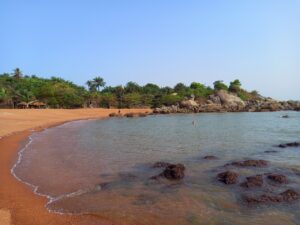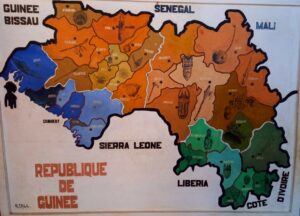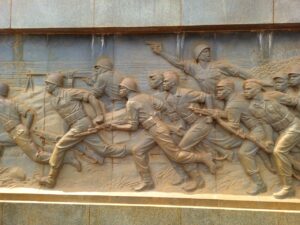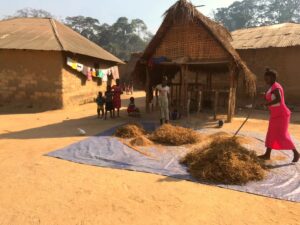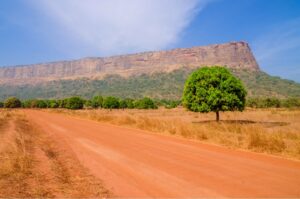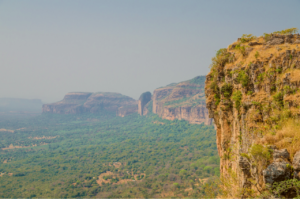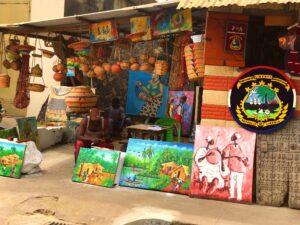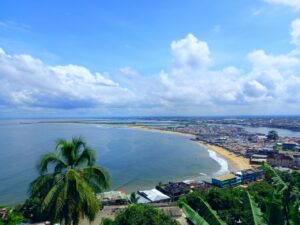Guinea, Liberia, Sierra Leone – 14 days
Western Africa is undoubtedly one of the most fascinating regions in Africa in terms of culture and history. The territories of modern-day countries such as Guinea, Sierra Leone, and Liberia were home to numerous local kingdoms, whose cultures and traditions have influenced the entire region of Western Africa.
European and North American influences have contributed to the creation of an exceptionally interesting cultural and ethnic mosaic in these three countries. Liberia deserves special attention as the first independent state in Western Africa, established by former slaves from North America. In addition to cultural and historical aspects, an important element of our trip will be the natural and scenic attractions, of which there is no shortage in Western Africa.
itinerary
Arrival in the capital of Sierra Leone in the afternoon or evening. After formalities, transfer to the hotel for an overnight stay.
D.
In the morning, we will start the tour of the capital of Sierra Leone. First, we will head to the Western Area National Park, covered with evergreen rainforest hills. We will visit the Tacaguma reserve and the chimpanzee research center located there. Then, we will return to the center of Freetown, where we will visit the National Museum, St. George’s Cathedral, and the Railway Museum. In the afternoon, we will take a ferry ride across Tagrin Bay to the town of Tagrin, from where we will head to the Lungi international airport. Departure from Sierra Leone
B.D.
After breakfast, we will set sail on a motorboat to the Banana Islands. This will be an opportunity to relax on some of Sierra Leone’s most beautiful beaches. The Banana Islands are not just paradisiacal beaches, but also hide a fascinating culture that emerged from the crossroads of European and African influences as early as the 17th century. In the afternoon, we will return to Freetown via the town of Kent.
B.D.
In the morning, we will head southeast in Sierra Leone to Tiwai Island, nestled between the meandering branches of the Moa River. We plan to arrive at the accommodation near the Tiwai Island Reserve in the afternoon. Dinner and overnight stay at a hotel or lodge.
B.D.
In the morning, we will embark on a full-day excursion to the reserve located on the island. Established in 1980, it focuses on the conservation of one of the world’s centers of endemism, the rapidly disappearing rainforests of West Africa. The park area is home to 135 species of birds and 11 primate species, including some of the most fascinating and endangered such as pygmy hippos and mandrills. Lunch will be served as a picnic within the reserve. In the afternoon, we will return to the hotel or lodge for dinner and an overnight stay.
B.D.
After breakfast, we will head towards the border with Liberia, crossing it near the town where we will stop for a short break. In the evening, we will depart for Monrovia, where we will have dinner and stay overnight at a hotel located in the coastal neighborhood of Mamba Point.
B.D.
After breakfast, we will embark on a full-day tour of the Liberia area. We will visit Providence Island, which houses a museum dedicated to the beginnings of settlement by former slaves who founded Liberia. We will also see the residential district, the National Museum, and the place where Liberian presidents are inaugurated. Those interested will have the opportunity to take a dip in the Atlantic Ocean. Overnight stay in Monrovia.
B.D.
After breakfast, we will depart from the Liberian capital. Along the way, we will stop for lunch in the small town of Totota. We will then drive through the agricultural areas of Liberia near the towns of Kakata and Kingsville. In the afternoon, we will cross the border into Guinea. In the evening, we will arrive in N’Zérékoré. Dinner and overnight stay in town.
B.D.
After breakfast, we will leave N’Zérékoré, located in the “forest” region of Guinea. On the way, we will stop in Kolulé to visit a local craft market. Then, we will head to the Zaim forest reserve, where we will have a short tour and rest. In the afternoon, we will travel to the town of Macenta. We will then proceed to the town of Guékédou for dinner and an overnight stay.
B.D.
We’ll depart Guékédou early in the morning and head towards Kissidougou, then continue north to the Upper Niger National Park, which was recently added to UNESCO’s list of Biosphere Reserves in 2022. The park boasts some of the most valuable savanna and humid forest areas in the region. We’ll spend the night at a lodge within the park grounds
B. D.
During a full-day excursion with park rangers, if luck is on our side, we will have the opportunity to encounter African elephants, which have the largest population in West Africa. Along the banks of the Niger River, we will also come across large groups of hippos
B.D.
Early in the morning, we’ll leave the Upper Niger National Park and head towards Mamou. On the way, we’ll make stops in Kissidougou and Dobola, where we’ll visit a historic mosque – one of the oldest in Guinea. Then we’ll continue our journey to Mamou, where we’ll have dinner and stay overnight.
B.D.
After breakfast, we will set out to explore the capital of Guinea – Conakry. On this day, we will see many interesting places, such as the National Museum, the Cathedral, the November 22nd Monument, and the market in the Kaloum district. If time permits, we will have the opportunity to take a short boat trip to the picturesque Los Islands located near Conakry. Night’s stay and dinner in Guinea will be provided.
B.D.
Depending on the departure time, transfer to the airport.
B.
Practical information
- the length of the tour : 14 dni in Africa;
- start of the trip: Freetown;
- end of the trip: Coankry;
- the highlights of this expedition We will start our journey from Freetown in Sierra Leone and end it in Conakry, Guinea. The most important attraction of the expedition is the opportunity to travel through very little-known, yet extremely interesting countries in West Africa, in terms of history, culture, and nature. We will have the chance to see endangered species of pygmy hippos and experience a classic safari in the Upper Niger National Park in Guinea. In addition, the most interesting part of the historical and cultural aspect of the expedition will be visits to cities such as Monrovia, Conakry, or Freetown, as well as exploring villages and towns inhabited by people of various nationalities, creating a unique ethnic, religious, and cultural mix of West Africa. An additional attraction will be the opportunity to swim in the warm waters of the Atlantic off the coast of Sierra Leone.
The trip is an expedition-oriented towards cultural, scenic, and nature tourism. Due to the specificity of the visited places and the nature of the trip, the good physical and mental condition is required from the participants. Long journeys on not-always-good roads in Sierra Leone, Guinea, and Liberia, often in temperatures exceeding +30 degrees Celsius, and accommodation in hotels, lodges, and campsites with limited access to toilets and showers can cause significant fatigue and discomfort. In addition, during the expedition, especially during the stay in Sierra Leone and Liberia, access to medical care may be very limited. Short treks in national parks and reserves are planned during the trip. The program has been designed to enable the best possible exploration of places outside the paths of mass tourism while maintaining basic safety standards and ensuring comfort for participants. It should be remembered that Sierra Leone, Liberia, and Guinea are countries of many cultures and traditions, with a specific, unique characters.
Depending on the political situation, the length of the tour and the order of visited places may change. In a situation of a serious threat to travellers’ safety, the tour may be cancelled. We will keep you updated as to whether the expedition is possible.
Your passport must be valid for at least 6 months after the planned end of the tour.
To go for the trip, it is necessary to obtain visas for the visited countries:
- The single-entry visa for the Republic of Sierra Leone can be obtained electronically
- The single-entry visa for the Republic of Sierra Leone can be obtained in Freetown Sierra Leone
- The single-entry visa for the Republic of Guinea can be obtained electronically
Four current colour photographs will also be necessary.
To obtain a visa, you may use the services of visa agents or the help of BTP Adventure.
You should take with you for the trip a photocopy of your passport (the photo page) and an additional ID document.
- Take with you for the trip the yellow vaccination booklet with certified valid yellow fever vaccination – it is impossible to enter the visited African countries without this document and vaccination.
- Before departure, we recommend a consultation with a family physician and a tropical medicine specialist.
- Vaccination against yellow fever, tetanus, diphtheria, viral hepatitis A and B, meningococci and typhus is recommended.
- Malaria prevention measures (Malarone or Lariam) are necessary.
- There is a risk of dengue and tuberculosis at the places planned to be visited during the trip.
- We recommend visiting https://travelhealthpro.org.uk/countries.
- During our expedition, we will drink only bottled water. You should avoid ice in your beverages and eating raw or undercooked foods. In the visited countries, healthcare is of very low quality. Private medical care that meets the basic standards is available only in big cities: Freetown, Coankry.
- Because of difficult travelling and accommodation conditions and particularities of the countries, good general health and physical fitness are necessary. Furthermore, your patience will definitely be tested and you should prepare for hardships of long journeys, lassitude and discomfort.
- Please take with you a first aid kit and a sufficient supply of your regular (prescription) medicines, if any. Some useful contents of the first aid kit:
- insect repellents – absolutely necessary
- malaria prophylaxis
- high sun protection cream (recommended SPF 50)
- disinfectants, wound dressing materials
- analgesics and antipyretics
- antibiotics, as a precaution
- anti-diarrhoeals, electrolytes and vitamins
- Sierra Leone, Liberia, and Guinea are currently stable and relatively safe countries. The actual terrorist threat or armed conflict risk is nowadays relatively low. We design our itineraries so as to avoid places that are potentially dangerous (the north-east region in Guinea and places with a high risk of conflicts.Owing to the good relations we have with local contractors, we keep following the news to be aware of any potential threats and safety risks. We also recommend you to read the latest news on the Foreign & Commonwealth Office website: https://www.gov.uk/foreign-travel-advice.
- During the tour, please take seriously the instructions of our contractors, guides and tour leader.
- It is very important to respect local customs and abide by local laws and regulations. You will receive the necessary information on an on-going-basis from your local guides and the tour leader.
- It is strictly prohibited to take photos and make video recordings at military and police installations and at airports. You are also not allowed to take photos where people in military/police uniforms are present!!!
- Photographing people is possible only when they expressly agree to it. Taking pictures when the subjects have not allowed it often ends up with escalating aggressive behaviours.
Each of the visited countries has its own currency. Currency exchange is possible at the airport, at border crossings, in banks and at some hotels. US dollars and euros are accepted at many places such as hotels, bars, souvenir shops. But the rate of exchange into the local currency should be agreed upfront. Using payment cards is possible at some shops, hotels and restaurants in larger towns. The best foreign exchange rate is for euros and US dollars. UK pounds are not generally exchangeable.
For current foreign exchange rates see www.xe.com or install xe.com on your phone.
Sierra Leone, Liberia, and Guinea are countries where many local languages are in use. The official and generally used language in Sierra Leone and Liberia is English. In the Guinea, the official language is French, For self-guided tours, you must speak English or French.
Sierra Leone, Liberia, and Guinea are multi-ethnic and multi-religious countries. Their inhabitants in are predominantly Liberia Christians. Sunni Muslims predominate in the Sierra Leone and Guinea . Women do not have to wear headscarves. Local customs and traditions are very much preserved.
It is very important to respect local customs and abide by local laws. You will receive the relevant information from your local guide or the tour leader.
The tour dates are proposed in periods of the best possible weather conditions at the sites included in the itinerary. The best time for trips to the visited countries is the period between October and February and between June and the end of August. Temperatures exceed +30°C during the day and +20°C at night. Rainfalls are possible. Major problems are low quality of roads, dust in the air in the dry season and mud after rainfalls.
For detailed information see https://www.meteoblue.com/en.
Mobile network coverage is available in most towns and villages. Similarly in the areas of national parks and nature reserves. Purchase of a local SIM-card is relatively simple and inexpensive. Before the trip, please enquire with your mobile network operator whether they have a contract signed with operators in Sierra Leone, Liberia, and Guinea and what the prices of call and SMS roaming are. To avoid a nasty surprise, we recommend disabling mobile data usage.
- Wi-Fi is available only at certain accommodation sites and in a handful of restaurants in the capitals.
- Additionally, we recommend taking a capacious power bank, solar charger or car charger. In national parks and in the course of car rides, it will be possible to charge electronic equipment only from vehicle power supplies.
- Sierra Leone Power sockets of type A. D. G. Voltage 230 V, frequency 50 Hz.
- Liberia Power sockets of type A. G. C. Voltage 120 V, frequency 50/60 Hz.
- Guinea Power sockets of type C, E and F. Voltage 230 V, frequency 50 Hz.
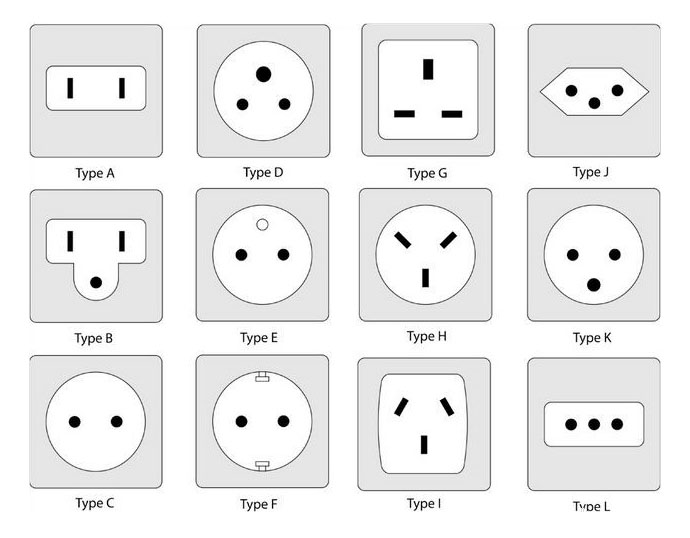
For climatic and cultural reasons, loose garments will be most appropriate: long trousers, long skirts, long-sleeved shirts, which can be easily washed and will quickly dry. The most comfortable footwear for the tour will be lightweight boots. Palladium brand boots are recommended. You may walk in open sandals but in towns and desert regions this may be uncomfortable because of stones, thorny plants and sharp grasses. Light hiking boots may prove useful.
The following are worth taking:
- thin summer sleeping bag; it will improve your sleeping comfort in the mountainous regions of Uganda and Congo
- sachet for documents and money
- wet wipes for body cleaning and antibacterial gels
- dry shampoo
- polar fleece jacket or warmer blouse, especially useful at evening and night times
- head cover and sunglasses – mandatory, the sun is no joke!
- comfortable summer clothes, useful during practically the whole trip
- light T-shirts/shirts
- useful odds and ends: torch, Swiss Army knife, sewing kit (usually is not needed but is not heavy and does not take much place), chargers, mug (for special occasions); inflatable neck pillow, useful on the plane and during car rides; small wallet for the local currency; books to pass the time on flights and car rides
Price
Price: £ 3990 p/p
Price per person for a group of at least 4 people. In the case of a trip for a smaller number of people, the price will be given individually:
During the expedition, we will travel by 4WD vehicles. The expected number of travellers in one vehicle will depend on the size of the off-road minibus + driver. Our cars may not be equipped with air conditioning or the air conditioning system may be switched off because of too much dust particles in the air. Speed depends on the road surface conditions, terrain characteristics and number and length of stops. During our trip, we will also use speedboats (Banana Island Sierra Leone), and also boats and small tourist ships while visiting national parks.
We are not able to guarantee a uniform accommodation standard at each of the planned sites during the stay in Sierra Leone, Liberia, and Guinea. Our priorities are your comfort, appropriate location, character of the site and historical, cultural and natural values. We always place emphasis on the support of local community when selecting the sites for our accommodation. In general, rooms will be assigned on the assumption of two people sharing a twin room (rooms with individual bathrooms). The surcharges for single rooms are quoted in the “Price” section.
- Accommodation in the visited countries is planned in 3- and 4-star hotels – African standard.
- In national parks, we will stay in African lodges.
Meals are included in the tour price, as specified in the itinerary. B – breakfast, L – lunch, D – dinner. Breakfasts will be provided at the hotel. We will go for lunches and dinners to local restaurants. The cuisine of Somalia is very varied, similarly as the culture and history of this part of Africa.
For information about the local costs of living see https://www.numbeo.com/cost-of-living/.
Services of a tour guide, local and special guides in National Parks
All entrance fees and permits to visit national parks and reserves in the itinerary
The price includes the cost of tips and porters’ fees.
Trip preparation, visa mediation, the invitation necessary to obtain a visa
Costs of the main flight to Freetown and from Conakry
Costs of flight tickets are not covered by the tour price. BTP Adventure does not directly arrange and buy tickets for international flights. However, we may suggest the best connections and airlines. For this purpose, contact us by e-mail or call us.
- Visas for the visited countries:
- The single-entry visa for the Republic of Sierra Loeone can be obtained electronically
- The single-entry visa for the Republic of Liberia can be obtained in Freetown Sierra Leone
- The double-entry visa for the Republic of Guinea can be obtained electronically
Insurance is not covered by the tour price. Having valid insurance is a condition for taking part in the trip. We recommend taking out insurance that will be appropriate for the planned itinerary and for your individual state of health and needs. Please send us the proof of your insurance contract.
You can purchase insurance on your own on the website of Axa or any other insurance company: https://www.axa.co.uk/travel-insurance/.
BTP Adventure may help you obtain adequate insurance cover. If you want our help, please contact us.
Meals other than those listed in the final itinerary.
Personal expenses and souvenirs.
Surcharge for a single room: 350 £
supplementary payment for the additional accommodation In the case of arrival or departure on a different date,
Depending on the political situation, the length of the tour and the order of visited places may change. In a situation of a serious threat to travellers’ safety, the itinerary may be modified. We will keep you updated as to whether the expedition is possible.
We can arrange a self-guided tour – if you are interested, please contact the office.
We will keep updating the detailed information on the safety and final itinerary of the tour. Before you decide to submit the booking form, please learn about the current political and sanitary situation in the visited countries.
The planned expedition is an exclusive proposal prepared on the basis of our experience and knowledge of the local peculiarities and major sightseeing attractions of Sierra Leone, Liberia, and Guinea.
We are committed to ensure the best possible and safe and, as far as feasible, comfortable travelling through these little-frequented and extremely interesting countries.
With any questions please contact BTP ADVENTURE
3990 £ Per Person
